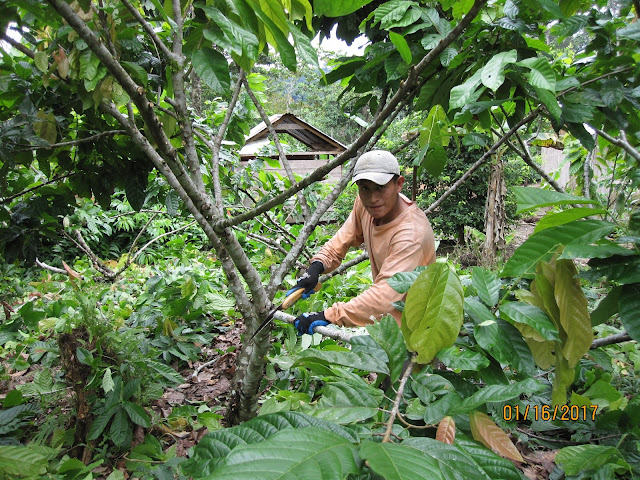10 Weeks in Puyo, Ecuador: Part I
By: Rip Winkel, F2F Volunteer
To start the year 2017 off, I am privileged to be working
on yet another Farmer to Farmer assignment, supported by the U.S. Agency for
International Development (USAID) through the Partners of the Americas. My
project takes me back to familiar territory in Ecuador. I am working in in the
Ecuadorian province of Puyo, a high-altitude land where the frequent rains run
off down into the Pastaza River that eventually joins into the Amazon. Since my
arrival here, I have been fortunate to work with the same communities as last
year, as well as adding couple of new ones to the project. And, just like
last year, this project is 10 weeks duration, instead of the normal 2 week length.
The date set for this project started on the 8th of January, and will go
through to 19th of March, 2017. Currently I am half way through the assignment,
and this article is the first of two that I will be writing; the second article
will be posted soon after my return to the United States.
 |
During a workshop, Hugo Mucushigua prunes cacao for
proper formation on his farm in Chuya Yaku.
|
The main goal of this assignment remains the same. My
objective is to train field technicians, representatives from Arajuno Road
Project (ARP), and members from communities partnering with ARP, in sustainable
management practices for cocoa production. More specifically, my goal is to
build on the progress that what was accomplished last year in the soil
sampling/analysis from the participating communities. During that analysis, we
sampled the soil's pH and levels of nitrogen, phosphorous, and potassium. My
work also includes leading workshops and training sessions on sustainable cacao
production (techniques that include pruning, grafting, soil fertility),
homemade organic pesticides, grafting methods and techniques, and soil
amendment practices and maintenance of possible tropical crops not being grown
currently.
Though arriving in Quito on the evening of Jan. 8, it was
well into the early morning of the 9th before I was able to get from the
airport to the hotel which was located in the historical district of the city.
Later that same day I traveled by bus to Puyo, arriving at the terminal by late
afternoon. I then took a taxi to the community of Kilometer 6, a town also
known as La Libertad. It is located on the route to Arajuno, and is the current
headquarters for ARP. As soon as I arrived, I unpacked my things and took some
time to relax and become familiar with my new surroundings.
 |
During a lecture on soil fertility, students from 10 de
Agosto analyze soil sample from their garden for pH.
|
The next few days were spent meeting with staff members
of ARP.. After orientation with the ARP staff, I also traveled a bit, touching
base with familiar as well as new communities with whom I would be working for
the next couple of months. There are four communities that we are engaging
currently, and they include Chuya Yaku, Esfuerzo 2, La Libertad, and 10 de
Agosto. Currently, we visit each community at least once a week, if not more,
during which time we'll conduct a lecture and a hands-on training lesson.
 |
| Planting veggies from the semillero in Esfuerzo 2. |
My schedule for each week goes as follows. Every Monday
and Thursday, I take a bus for one and a half hours down into the Amazon Basin,
arriving in the Chuya Yaku area to conduct a pruning workshop, accompanied with
a discussion on different topics, like soil structure and fertility, methods to
address fungus and insect problems, as well as review grafting techniques. For
each pruning workshop that is conducted the group meets at a different cacao
farm belonging to one of its community members.
On Tuesdays the day begins with meeting in Esfuerzo 2,
where a lecture is conducted, again on different topics that pertain to
community/family gardens, organic pesticides, and grafting techniques. This
community just happens to meet on its own every Tuesday morning to work over
compost piles, and in which has become quite a successful little business in
the Puyo area. I begin working with them as soon as they are done with their
work. The lectures given take place after their work detail was finished. From
here it’s back to La Libertad to help out Rodrigo Engarcia of ARP to conduct a
workshop and/or to give a lecture.
 |
| At La Libertad, a lecture on the characteristics of soil was conducted before work in the green house began. |
On Wednesdays, I meet with a group of 10 year-olds at the
school in 10 de Agosto. It had been requested by one of the teachers to
investigate what caused the die-off of the vegetable plants in the garden. In
conversing with them, the opportunity presented itself to give classroom talks
on a variety of agricultural issues like plants, soil, composting, and to have
workshops where the garden area can be re-planted with a variety of different
or new types of vegetables. When finished, it’s back to La Libertad to meet
with Laura Hepting of ARP to discuss and review various agricultural topics in
detail.
Friday is for gathering information and sourcing
materials in Puyo, or elsewhere.
Thanks for reading! In my next report, I will explore
with more detail what sort of project we have in these communities as well as
the individuals involved in Arajuno Road
Project.

.png)

Comments
Post a Comment